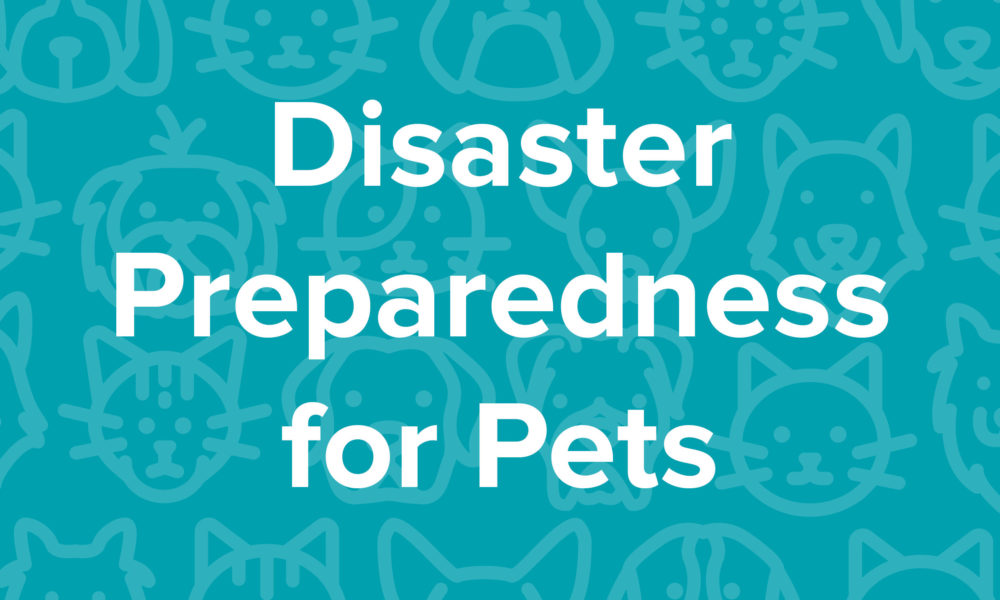Disaster Preparedness for Pets

The season for tropical storms and hurricanes is approaching and since the Potter League Animal Care & Adoption Center is located in a coastal town that tends to be more susceptible to these adverse weather conditions, we thought that you should know how to prepare for storms, evacuations and other emergencies for your pets.
One of the first and easiest things you can do is to get a rescue alert sticker for your home. This sticker is placed on a window and tells rescue workers that there are pets in the home. And wouldn’t you know, we have some available at the Potter League! You can also get these stickers at some pet stores or order them. If you evacuate and take your pets with you, be sure to write ‘EVACUATED’ on the sticker so rescue workers don’t waste time looking for them.
You should also consider having your pets microchipped or if they already are, make sure the contact information associated with the chip is up to date. This will help to reunite you with your furry family members should you become separated.
Next, you’ll want to find a safe place for you and your pets to go in case there is an evacuation. If it’s not safe for you to stay behind, it’s not safe for them either! Some of the options include:
- Local hotels or motels that accept pets – not all of them do so it’s best to find ones that do in advance
- Animal shelters – some local animal shelters offer emergency shelter for pets. Potter League is in fact a RI State Emergency Pet Shelter (RISEPS)
- Local boarding facilities to see whether they may be able to provide emergency shelter
- Friends or relatives outside your area may be able to house your pets (and you!) temporarily
- Temporary emergency shelters – many communities set up temporary shelters during disasters for people who must evacuate their homes. Some of these will take pets but many will not so it’s best to research alternatives for your pets in case you need to go to one of these shelters.
You should have an emergency kit for yourself, but don’t forget one for your pets. You should plan to have 3 to 7 days of supplies because if there are power outages, stores may not be able to open. The kit for your pet should include:
- Your pet’s collar with current identification tags, leash, and a sturdy harness
- Food and bottled water
- Your pet’s medical and vaccination records. This is especially important if you need to board your pet in an emergency shelter or boarding facility but may also be needed if your pet gets sick or injured and needs veterinary care. This information can be on paper, on a USB drive, or in the ‘cloud’ but remember, if there is no power, electronic copies may not be accessible.
- Any medications that your pet takes regularly. Prescriptions are also good to have on hand.
- Disposable litter trays and cat litter for cats
- Disposable bags for clean-up. Disposable bags that come on a roll are handy because they can be used for cleaning up after dogs and scooping a litter box – and they are easy to carry and store.
- Cleaning materials such as liquid soap, disinfectant, and paper towels
- An appropriate-sized crate or carrier for each pet
- Blankets for bedding. A pet bed may be more comfortable for your pet but is also not easy to carry or store if you are staying somewhere temporarily.
- Recent photos of your pet in case you get separated.
- Pet toys – their favorite toys may be comforting when your pets are stressed or in an unfamiliar place
- A pet first aid kit – you can purchase one of these already stocked or make your own
- In addition, for birds (the most important pet of all, in my opinion!) you should have a travel cage or carrier with a blanket or cover for warmth or to decrease stress, and if they have leg bands, keep them on so your bird can be identified.
After the storm, you will need to protect them from any remaining hazards like broken glass or other debris and inspect any areas like a fenced yard to be sure that it is secure before letting them loose. Just like yourself, your pet will need time to readjust and may be stressed or upset. They may become temporarily defensive or aggressive. If you are unable to return home immediately, try and make a safe, familiar space for them wherever you are. Put their blanket or bedding and some toys in a quiet spot – this may be their crate or carrier – and give them time to adjust to the changes. If behavior problems continue, consult your veterinarian.
Hopefully, this is advice that you won’t need to use, but it is better to be prepared!
